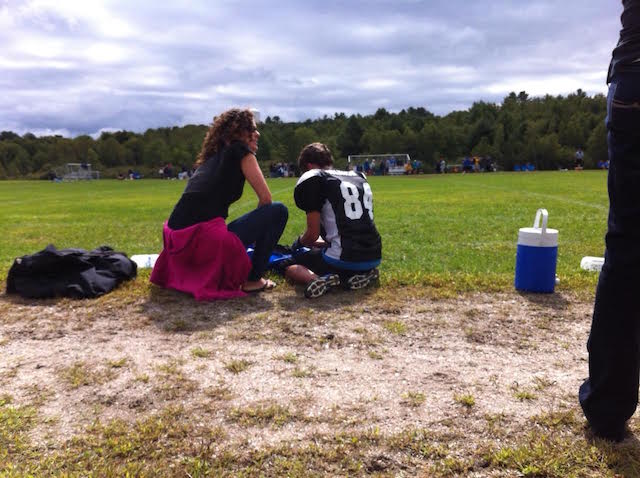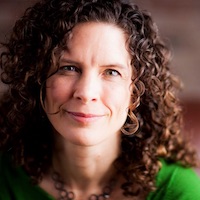
Have you ever thought you were done with something—wiped your brow—and then realized something was amiss, and you had to start over again?
Have you ever had this happen to you, month after month after month?
This is the world of co-parenting, after divorce, when there are two of lots of things—like opinions, families and houses—but only one of some pretty critical things, like Thanksgiving, birthdays and school backpacks.
At the time of my divorce, the visions dancing in my head were most heavily steeped in freedom and justice and—actual dancing. I was done with being weighed down with my relationship problems and issues. I was going to discover the perfect man, have perfect fun and rediscover perfect joy. Nine years later, the reality of co-everything challenges me to find peace with and within my day, again and again.
Do we find ease in our new lives after divorce? At 45, I feel grown up for the first time in my life. I feel calm and grounded—on some days at least—so that is lovely. But there is an important part of my life that never reaches “ease”—the non-stop requirement to negotiate my children’s lives.
Every decision now runs through two families—the sports they play, the weekend activities they sign up for and the age at which they can date. This fall, my son ripped his ACL playing football—the sport I didn’t want him to play—but I was overruled, because I only control 50% of my children’s lives. If you think about it, in a game where everyone controls 50%, no one can ever win. Compromise is literally the name of the game.
Do we find perfection after divorce? Yes, I happened to find a lovely relationship, eight years after “d-day,” and after far too many painful, confusing ones. No, he isn’t perfect and neither am I. I like so much about him and he brings me heretofore unparalleled joy. Unexpectedly, it isn’t he who changed me or fit me perfectly. It is I who changed, to allow a more perfect fit.
I have discovered that all human beings are wildly imperfect—and rather unpredictable—but imminently improvable. We have to do the work, not to reach perfection, but to realize there is no perfection and that a healthy, fun relationship requires our calm presence and undivided attention each and every day.
Within this world of dis-ease, what can we do to reconcile our pain with our present?
We can put our egos away. With kids, it is rarely about us anyway, but now there will be even less of us in the equation. When our sons cry for their dads in the middle of the night, we will simply call him. When our daughters announce how much fun they had with their new step-sisters, we will simply smile and say, “That’s great.” We will feel pangs of jealousy clawing at us, threatening to thwart our promises to never say a bad word about their lives with the others. We will take a breath and remember that this isn’t about us and smile the pain away.
We can choose our battles. So, we control only 50%—this means that when our children aren’t with us, someone else is in charge—and not just our ex, but another adult who sees him or herself as an extra parent, with their own parenting beliefs that may not jive with ours.
I used to send over a chore chart to my ex, just in case he wanted to implement the same dictates in his house. I used to tell him what the kids ate in my house, just in case he also wanted to reduce gluten and red meat. Now, I set rules for my household that go no further than my doorstep. I ask my children if the different rules in the two households, both alike in dignity, bother them. As long as they say “no,” I vote we move on, and leave the other household alone.
We can let it go. In this new world of split time, we really have no choice but to let it go—lest we are enveloped by our anger. I did this recently. I, with a strong resigned exhale, let go of my plans to go apple picking with my children on one of those perfect autumn weekends. Why would I do this? My daughter had texted me that her other family just went—yet again, beating me to the punch—not in malice, but in happenstance. Because of how life is, this happens all the time. But we get to choose to let it go and move on.
We seek freedom in divorce, and we get it, but we lose some as well. However, there is measurable good in this alternative configuration of our lives. Think about what your children will learn from you as you practice letting go. Our children will know that we can fight for what we believe in, persevere even when the cards are stacked against us, and that we know when to call it a day. They will see us through altered eyes, as adults who consider and makes choices, many of them hard. They will feel that many people can love them, from all angles, in their own ways.
In the end, my “ever after” is different and a bit more challenging than what I had imagined—and, I am sure—from what my children imagined as well. Divorce leads to compromise and less control over our children’s lives, but if we can reach a place of peace with this altered “ever after,” our children will likely reach that place too.
What I have realized is that just as nurturing good, healthy relationships is a daily practice of presence, letting go and loving—so is divorce.
We have to get good at divorce too—at cultivating a daily practice of letting go and finding peace within.
.
Relephant:
A Guide to Fairness for Families in Divorce.
.
Author: Erin Oldham
Editor: Yoli Ramazzina
Photo: Author’s own.






Read 4 comments and reply